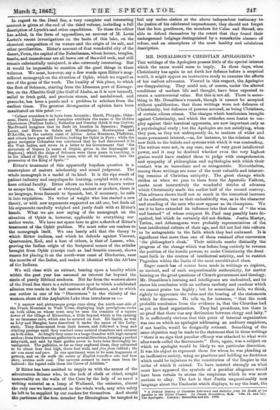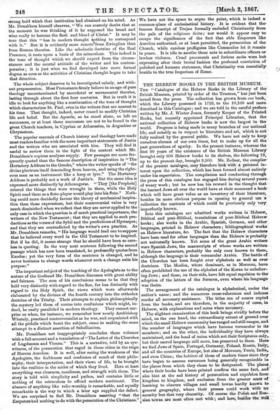MR. DONALDSON'S CHRISTIAN APOLOGISTS.• Thu writings of the Apologists possess
little of the special interest which the name would seem to imply. In these days, when Christianity has again to set forth her defence before a sceptical world, it might appear an instructive study to examine the efforts( of her earliest advocates. Viewed in this respect, the Apologies are disappointing. They could not, of course, under the altered conditions of modern life and thought, have been expected to retain a controversial value. But this is not all. There is some- thing in Mr. Donaldson's remark, though it cannot be accepted without qualification, that these writings were not defences of Christianity, but defences of persons accused, as being Christians, of certain odious crimes. The charges which heathenism brought. against Christianity, and which the orthodox soon learnt to em ploy against their heretical opponents, are now important only as: a psychological study ; but the Apologies are not satisfying, when they pass, as they not =frequently do, to matters of wider and more permanent interest,—as, for instance, to the relation of the new faith to the beliefs and systems with which it was contending.. The writers were not, in any case, men of very great intellectual power, and it may be doubted whether even the very highest genius would have enabled them to judge with comprehension. and sympathy of philosophies and mythologies with which their contact was so immediate and so antagonistic. Nevertheless, among these writings are some of the most valuable and interest- ing remains of Christian antiquity. The great change which strikes us when we pass to them from the Apostolic Fathers, marks most instructively the wonderful strides of advance which Christianity made the earlier half of the second century. This advance shows itself not so much in the numerical increase of its adherents, vast as that undoubtedly was, as in the character and standing of the men who now appear as its champions. We see it to have extended its influence into that class of " the wise. and learned" of whose conquest St. Paul may possibly have de- spaired, but which he certainly did not disdain. Justin Martyr; Tatian, and. Athenagoras were probably representatives of the best intellectual culture of their age, and did not feel this culture to be antagonistic to the faith which they had embraced. It is significant that more than one of them retained after conversion ' the philosopher's cloak.' Their attitude marks distinctly the progress of the change which was before long entirely to reverse the position of the hostile powers, to make Christianity the dorni nant faith in the centres of intellectual activity, and to restrict Paganism within the limits of the most uncultivated class.
Eager search has of course been made in writings so copious, so ancient, and of such unquestionable authenticity, for matter bearing on the great questions of Church government and theology. Mr. Donaldson's learning and intelligence are undoubted, and he states his conclusion with an uniform modesty and candour which we cannot praise too highly ; but he sometimes fails, we think, rightly to appreciate the value and the bearing of the statements which he discusses. He tells us, for instance, " that the most probable conclusion from the evidence is, that the Churches had as yet no fixed organization. They had presidents, but there is. no proof that there was any distinction between clergy and laity." It is sufficiently obvious that this point of internal organization was one on which an apologist addressing an auditory suspicious, if not hostile, would be designedly reticent. Something of the same objection may be made to the statement that in these writings "there is no sign that peculiar efficacy was attached to what were afterwards called the Sacraments." Here, again, was a subject on which an apologist would be likely to use particular discretion. It was his object to represent those for whom he was pleading as an inoffensive society, using no practices and holding no doctrines which could be injurious to the constitution of the Empire in the midst of which it existed. To have insisted strongly on what must have appeared the symbols of a peculiar allegiance would have been certain to arouse the suspicions which he was most anxious to allay. The fact is that Justin unquestionably uses language about the Eucharist which displays, to say the least, the • A Critical History of Christian Literature and Doctrine from the Death of the Apostles to the Nicene Council. By James Donaldson, M.A. Vols. IL and II/. The Apologists. London: Atileallthill and Do. 1866.
strong hold which that institution had obtained on his mind. As Mr. Donaldson himself observes, " We can scarcely doubt that at the moment he was thinking of it he supposed the bread and wine really to become the flesh and blood of Christ." It may be true that this " has in modern thought iothing to correspond with it." But it is evidently more remote from Zwinglian than from Roman theories. Like the scholastic doctrine of the Real Presence, it rests upon a basis of the miraculous. This indeed is the tone of thought which we should expect from the circum- stances and the mental attitude of the writer and his contem- poraries; it is just what we find developed into more formal dogma as soon as the activities of Christian thought began to take that direction.
The whole subject deserves to be investigated calmly, and with- out prepossession. Most Protestants firmly believe in an age of pure
theology uncontaminated by sacerdotal or sacramental theories, lasting through about the first four centuries. But in truth it is idle to look for anything like a continuation of the tone of thought which characterizes St. Paul, even in the writers that are nearest to
his time. That thought, indeed, never ceased to modify Christian life and belief. But the Apostle, as he stood alone, so left no
successors, or at least those successors are not to be found in the great Church teachers, in Cyprian or Athanasius, in Augustine or Chrysostom.
The popular manuals of Church history and theology have made most readers familiar with the more important statements of Justin and the writers who are associated with him. They will find it useful to review them in the light of the context which Mr. Donaldson's copious analyses supply. Few passages are more fre- quently quoted than the famous description of inspiration in " The Hortatory Address to the Greeks," where the writer speaks of "the divine plectrum itself descending from heaven, and using the right- eous man as an instrument like a harp or lyre." The Hortatoq Address is probably not a work of Justin's. But the same idea is expressed more distinctly by Athenagoras. " They [the Prophets] uttered the things that were wrought in them, while the Holy Spirit used them as a flute-player would play into his flute." Noth- ing could more decidedly favour the theory of mechanical inspira- tion than these expressions, but their controversial value is very much diminished when we reflect that they are never applied to the only case in which the question is of much practical importance, the writers of the New Testament ; that they are applied to such pro- ductions as the verses of the Sybil and the predictions of Hystaspes ; and that they are contradicted by the writer's own practice. As Mr. Donaldson remarks, " His language would lead one to suppose that he believed every word in the Old Testament to be inspired. But if he did, it seems strange that he should have been so care- less in quoting. In the very next sentence following the second passage which has now been translated, he professedly quotes from Exodus ; yet the very form of the sentence is changed, and he never hesitates to change words whenever such a change suite his purpose."
The important subject of the teaching of the Apologists as to the nature of the Godhead Mr. Donaldson discusses with great ability and fairness. The sum of his conclusions seems to be that they held very distinctly with regard to the Son, far less distinctly with regard to the Holy Spirit, the views which were afterwards elaborated by the divines of the fourth century into the orthodox doctrine of the Trinity. Their attempts to explain philosophically the mystery led them of course into confusions which might, in- deed, be easily paralleled in modern theology. They cannot sur- prise us when, for instance, we remember how nearly Archbishop Whately, practised controversialist as he was, and acquainted with all the pitfalls which beset the subject, came in making the same attempt to a distinct assertion of Sabellianism.
Mr. Donaldson not inappropriately concludes these volumes with a full account and a translation of "The Letter of the Churches
of Lugdunum and Vienna." This is a narrative, told by an eye- witness, of the persecution that raged in those cities in the reign of Marcus Aurelius. It is well, after seeing the weakness of the Apologists, the feebleness and confusion of much of their philo- sophy, their interpretation, and their views of life, to be brought into the realities in the midst of which they lived. Here at least everything was clearness, manliness, and strength with them. The story is told with simplicity and pathos, and contains little or nothing of the miraculous to offend modern sentiment. The absence of anything like relic-worship is remarkable, and equally remarkable is the way in which a later age supplied the defect. We are surprised to find Mr. Donaldson asserting "that the Emperors had nothing to do with the persecution of the Christians." We have not the space to argue the point, which is indeed a. common-place of ecclesiastical history. It is evident that the famous Rescript of Trajan formally excluded Christianity from the pale of the religiones licitte; nor would it appear easy to- escape the significance of the fact that able Emperors like Aurelius authorized, or at least permitted, the persecution of the Church, while careless profligates like Commodus let it remain in peace. It is idle to ascribe these acts to subordinate officers or lawless violence. Cruel proconsuls and furious mobs were but expressing after their brutal fashion the profound conviction of polished and humane statesmen, that Christianity was essentially, hostile to the true Imperium of Rome.































 Previous page
Previous page